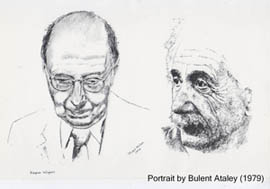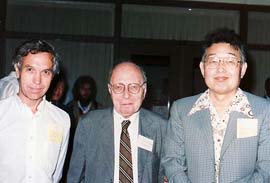On March 8, 1979, there was an Einstein centennial conference at the Institute for Advanced Study (Princeton, New Jersey, U.S.A.). Eugene Wigner was one of the key-note speakers. Dieter Brill took a note of Wigner's talk. Let us see what Wigner had to say about Einstein. Brill, Wigner, and Kim are in this photo taken in 1988 during the first Wigner Symposium held at the University of Maryland. |
Einstein and the Unity of Theoretical Physics
Eugene Wigner

|
-
I knew Einstein in earlier years than most of us. I saw him in the
Physics Colloquia in Berlin on Thursday afternoons from 1920 on.
Einstein sat in the first row with other notables like Nernst,
von Laue etc. He did not speak much, but if something was unclear,
he asked questions, tried to explain the physics. The colloquia
consisted of 3 or 4 papers, chosen by von Laue, and he
would ask for volunteers to review them. It was wonderful, and should
be done today. Colloquia today are a single paper by the author of
the paper, and as a consequence we are much more ignorant about the
whole of physics than people were then. At that time I did not meet
Einstein personally; there were about 60 participants in the colloquium,
who did not all know each other well.
Later I attended a seminar on statistical mechanics by Einstein, a topic which was of great interest to him. There were 25 to 30 participants, and Einstein gave people topics to review, keeping himself in the background. He would speak up when he realized that the rest of the audience did not understand. He was marvelous at explaining things -- he could demonstrate mathematics with his hands. He was very modest, no one felt interfered with, he was just one of the audience. Since the subject was not relativity, he could be more of an equal to the others, for it was not his ideas that were being discussed. The way he behaved was very charming, and that was even more unusual in Germany at that time. Since he was the director of the Max Planck Institut (called Kaiser Wilhelm Institute at that time, KWI for short), he had no obligation to give such a seminar. I worked at the KWI for physical chemistry right next door, and for a long time did not even know that Einstein was the director, since he was entirely on an equal basis.
He was this way also at Princeton. But his relation to colleagues and students there was much less close. Part of the reason is that he was not at home with English, and that is really needed for a nice conversation. Listening to a speech in English was hard for him. He always said "a quadrat" instead of "a squared". Now that's just as good -- but it isn't the same. Another reason was that he was preoccupied with his great concern for the political situation. A third reason was that his interest was to modify General Relativity to make a common basis for all of physics, or all of science. His colleagues at the Institute, on the other hand, were mathematicians, and they had the large influence. The interest of physicists was application of quantum mechanics, to incorporate chemistry into physics etc. Einstein wanted basic knowledge. Eisenhart was interested in the basis of General Relativity, but in the rigorous mathematics, and was averse to speculations about unification with electromagnetism. So Einstein's contacts were confined to a small circle of collaborators and a few friends who could speak German.
Einstein did not believe fully in the statistical interpretation of quantum mechanics. He realized that no physical theory is final, and thought that perhaps one can discover a basis of quantum mechanics so that one can feel at home in it. By ignoring quantum mechanics he played dice, hoping quantum mechanics could be eliminated. He may still be right. But he did listen to colleagues, and had a pleasant relation with them, which was uncommon. Also he loved children, there are many anecdotes about that.
The great generality of his early interests is shown by the variety of papers, about 60 of them, which he published between 1905 and 1915: In addition to special and general relativity he worked on statistical mechanics, Brownian motion (simultaneous with Smolukovski), a new derivation of Planck's formula, in a way the foundation of the laser, solid state, decreasing specific heat with temperature. He believed in the quantum more than Planck., because Planck modified it to get slow emission, to make it more classical. Einstein first applied quantum theory to different phenomena, such as the photoelectric effect, which earned him the Nobel Prize (a "safer" achievement than Special Relativity).
His interests also manifested themselves in the colloquia; he spoke up on all subjects. Most remarkable was his immediate acceptance of Bose statistics. He reviewed that paper in the colloquium. But he thought the Bohr - Kramer - Slater paper erroneous: he believed in conservation laws. The Bothe-Geiger experiment interested him, but he felt the result was obvious from the start. By that time it was accepted that Poincaré invariance leads to conservation laws. He was early aware of the wave-particle duality. To explain it he proposed a "Führungsfeld": the EM field is governed by Maxwell's equations, but it only guides the photons. This is close to present ideas on the connection between particles and fields. He discussed this a good deal privately, but never published it because it is incompatible with energy-momentum conservation. In a collision one particle does not know which part of the field to choose in order to satisfy the conservation laws. This problem was solved only by Schrödinger, who realized that the "guiding field" operates in configuration, rather than in ordinary space. He considered that Schrödinger's greatest accomplishment.
The idea of Unity in theoretical physics is that there should be one basic principle from which all laws follow as limits. For example, in Newtonian theory one neglects all fields but gravity. Maxwell includes the electromagnetic field, but neglects microscopic structure. (The first physics book I ever read said that atoms may exist, but they are irrelevant for physics: physics was purely macroscopic then.) Even today physics deals with limiting cases.
The General Law would encompass much more than present theories. Einstein always hoped for that. No discussion of life or consciousness by Einstein is known to me. It is possible to say, the world exists because I look at it, but my description of observation by another person is incompatible with present-day quantum mechanics. If someone -- say Prof. Yang here -- observes a non-causal phenomenon, e.g. a collision with a possible excitation, so that the final state is a superposition, then he is in a superposition himself. But this is evidently incorrect, because he has always either seen something or he has not. So the superposition description is incorrect, he should be in a mixture; and this is true even for less gifted people than Prof. Yang.
This shows clearly that present day quantum mechanics is not applicable to life. But it appears to be applicable to all of physics where life plays no role. Einstein firmly believed in causality, hence had an aversion to quantum mechanics. I propose that causality is not valid even for inanimate nature. As Zeh pointed out, 1 cm3 of a gas has such closely spaced energy levels that even an electron very far away can induce transitions; therefore the gas cannot be isolated. (His calculation was not quite right, but the result is correct.) I was very interested in Riess' paper, that even in intergalactic space the density of matter is so high that no macroscopic system can be isolated. Now, (micro)causality applies to macroscopic bodies: even if I knew the wave function for a cm3, in a minute it would be in a mixture. To have causality at the macroscopic level, I should need the wave function for the whole universe, which of course is nonsense. Therefore I think we should look for deviations from the present-day quantum mechanics.
Click here for Wigner photos.
Portrait of Wigner and Einstein by Bulent Atalay (1978).
